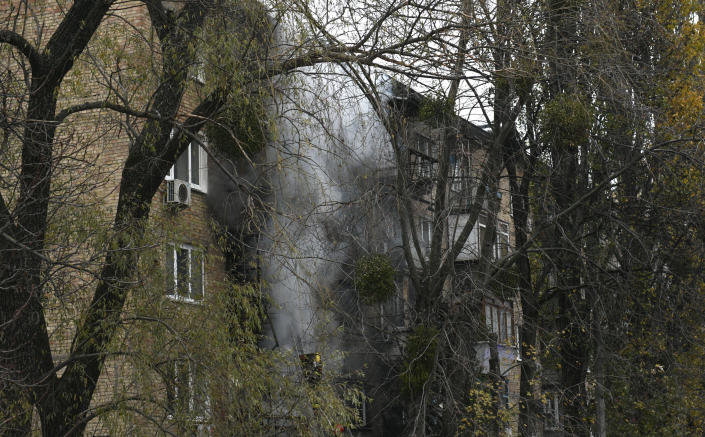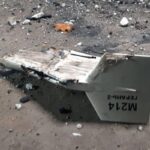Ukrainian President Volodymyr Zelenskyy has triumphantly framed the liberation of Kherson after Russia’s retreat as a watershed moment akin to D-Day that heralds the “beginning of the end” of the war after nearly nine months.
Exactly what that end should look like may be different for Ukraine, its Western allies and Russia. It’s a question that has increasingly come into focus as Kyiv’s forces solidify gains from summer counteroffensives and Moscow’s military digs in behind new defensive lines while striking energy infrastructure across the country.
In recent weeks, senior U.S. officials have suggested the winter, with its freezing conditions likely to make sweeping battlefield gains difficult and civilian life painful, may be a perfect time for the two sides to finally negotiate.
Zelenskyy himself proposed a 10-point plan for peace in a virtual address to world leaders at the Group of 20 summit in Indonesia on Tuesday, urging that “now is the time” to end the war. But while he appeared to have shifted emphasis away from dismissing the very idea of talks with Russian President Vladimir Putin, Ukraine’s position does not seem to have softened in substance.
An intense new wave of attacks targeted cities across the country Tuesday, forcing widespread blackouts.
“This is what Russia has to say on the issue of peace talks,” foreign minister Dmytro Kuleba said on Twitter. “Stop proposing Ukraine to accept Russian ultimatums! This terror can only be stopped with the strength of our weapons & principles.”
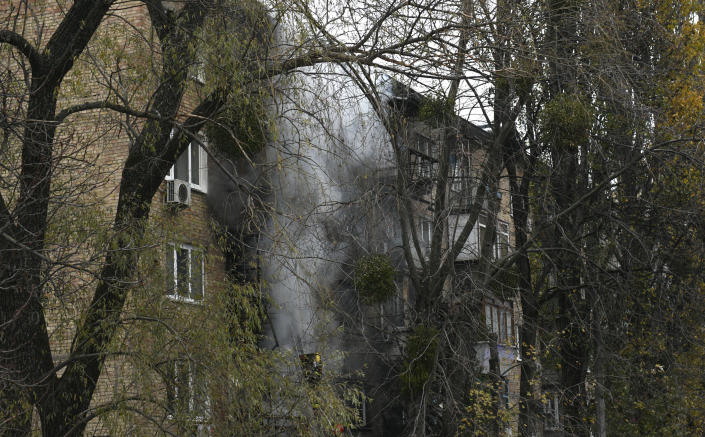

Military analysts told NBC News earlier this week that there was little sign the two sides were any closer to peace, with Kyiv likely emboldened to keep pushing to liberate all of its territory rather than give up occupied land in a compromise.
“It suits neither side at the moment because the Russians are confident they’ll be able to defend what they have and the Ukrainians are confident they’ll be able to take what the Russians have,” said Frank Ledwidge, a senior lecturer of law and strategy at the University of Portsmouth in the United Kingdom.
Gen. Mark Milley, chairman of the Joint Chiefs of Staff, described an approaching “window of opportunity for negotiation” last week, publicly voicing a position shared by some U.S. and Western officials who increasingly believe that neither side can achieve all of their goals in the war, officials familiar with the matter told NBC News.
Kyiv does not appear to share that belief.
“Ukrainian servicemen accept no talks, no agreements or compromise decisions,” Commander-in-Chief Valery Zaluzhny wrote on Telegram late Monday after a telephone conversation with Milley.
“We will not allow Russia to wait it out, build up its forces, and then start a new series of terror and global destabilization,” Zelenskyy said in his speech to the G-20, referring to it as the “G-19” in a jab at Moscow.
.@ZelenskyyUA demonstrated leadership again today by making clear he is prepared for diplomacy toward a just end to the war Russia started. Russia’s response was another wave of missiles. These attacks will not break Ukraine’s will—we will be with Ukraine for as long as it takes.
— Secretary Antony Blinken (@SecBlinken) November 15, 2022
Russian Foreign Minister Sergey Lavrov, who led Moscow’s delegation to the summit, countered that “all problems are on the Ukrainian side that categorically refuses to hold any talks and comes up with conditions obviously unrealistic and inadequate to this situation.”
Ukraine retook the city of Kherson and much of its surrounding area Friday after the Kremlin ordered a retreat, surrendering the only regional capital it had captured since launching its full-scale invasion in the latest embarrassing blow following weeks of pressure from Kyiv’s counteroffensive.
Control of the crucial southern city could serve as a gateway to the nearby Crimean Peninsula, which Russia has occupied since 2014 and Ukraine has vowed to restore its sovereignty over as part of any resolution to the fighting.
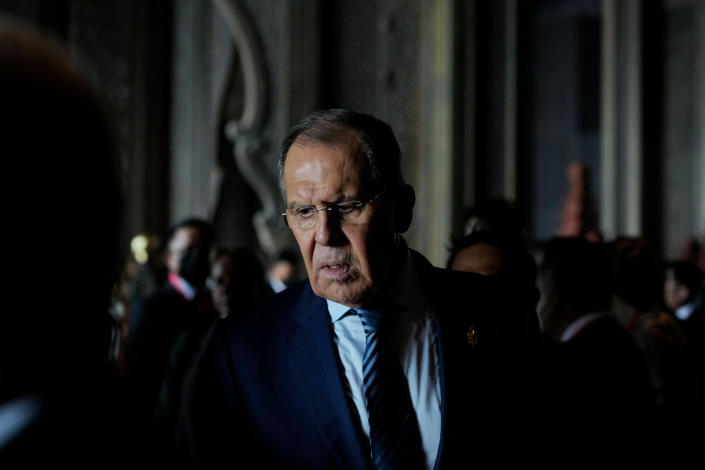

“The more Ukraine can demonstrate that it can win this war, the less will be the pressure to give in to Russia for the sake of bringing it to a premature end,” said Keir Giles, a senior consulting fellow at Chatham House, a London-based think tank. There is a growing recognition that a temporary respite from the fighting on the ground would allow Russia to regroup, he said, “and then relaunch the offensive at some future date.”
With the United States’ strategy of continuing to arm Ukraine likely intact after Democrats retained control of the Senate, analysts said, Kyiv’s forces may look to push forward and retake more territory in the coming weeks.
“They clearly have plans to keep the offensive going,” said Rajan Menon, a director at Defense Priorities, a Washington-based think tank. “It makes perfect sense” for Ukrainian forces to reach the Kinburn Peninsula south of Kherson, gaining a tactical advantage around the Black Sea, he added.
“Hard fighting does remain for Ukraine as they seek to liberate occupied territory,” a senior military official said, adding that the U.S. and its allies would “ensure that they have what they need to succeed on the battlefield.”
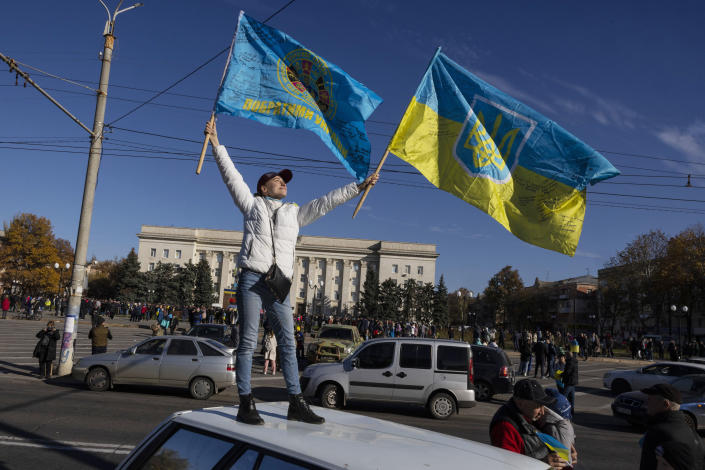

With each new humiliating pullback, the pressure on Putin grows and the hand he would take into any negotiations appears to weaken. The Russian leader has faced rare domestic criticism in recent weeks as a series of retreats combined with his chaotic call-up of military reservists stirred public disquiet.
“Saying we cannot hold sovereign Russian territory, that’s not a good look for Putin, who has positioned himself as the avatar of Russian nationalism,” Menon said, referring to the Kremlin’s claim to have annexed Kherson alongside three other Ukrainian regions last month.
“Putin is politically in the weakest position he has been in his presidency,” Menon added, “because he owns this war, he decided to launch it, he can’t walk away from it, and now it’s not looking so good.”
Russia’s military has dug into new, entrenched positions deeper into that territory and caused widespread power and water outages with its missile attacks.
The strikes on Kyiv and other cities Tuesday signaled the setbacks in the south were unlikely to immediately change this strategy and persuade Moscow to come to the table willing to compromise.
“He [Putin] hopes that the pressure of winter and the pressure of ammunition attacks and missiles will essentially wear down Ukraine,” extending the conflict and waiting out Western support, said Christopher Tuck, a reader in strategic studies at King’s College London.
The U.S. insists that support for Ukraine is going nowhere, and may only be hardening with each new Russian salvo.
“These Russian strikes will serve to only deepen the concerns among the G-20 about the destabilizing impact of Putin’s war,” National Security Adviser Jake Sullivan said in a statement condemning Tuesday’s attacks. “The United States and our allies and partners will continue to provide Ukraine with what it needs to defend itself, including air defense systems,” he added. “We will stand with Ukraine for as long as it takes.”
This article was originally published on NBCNews.com

